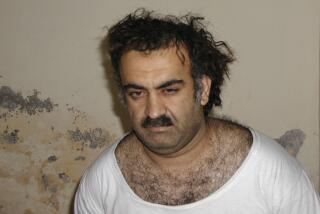Sorting Iraqi POWs
- Share via
WASHINGTON — The U.S. military has released 887 Iraqi prisoners of war, but some of the nearly 7,000 remaining prisoners could be kept in U.S. custody for many months as the Bush administration weighs how to handle irregular fighters, Pentagon officials said Friday.
Most of the prisoners being held at a makeshift prison in the southern Iraqi city of Umm al Qasr are conventional soldiers who, under international law, must be released by war’s end, Pentagon officials said. Those already released were found to be innocent civilians.
But defense officials say the captured Fedayeen Saddam paramilitary fighters and other irregulars outside Iraq’s military will remain imprisoned while U.S. officials consider their fate. They include foreigners who joined the Iraqi fighters against the U.S.-led attack.
Prisoners deemed “unlawful combatants” would have the same twilight legal status as the Al Qaeda fighters sent to the U.S. military prison at Guantanamo Bay, Cuba, after the war in Afghanistan, leaving them without rights under the international laws outlined in the Geneva Convention.
Pentagon strategists said there are no current plans to send any of the prisoners from Iraq to Guantanamo Bay, where some prisoners captured in Afghanistan have been held for a year or longer without being charged.
A decision to leave these prisoners in legal limbo could further divide international opinion on the U.S.-led war against Iraq. It also could delay U.S. efforts to end direct military involvement in Iraq as soon as possible.
“There is pressure to finish it and get out, so the government has competing interests,” said Eugene Fidell, president of the National Institute of Military Justice, a Washington-based legal association.
Bush administration talk suggests a tough approach toward the irregular fighters. The description of the Fedayeen fighters during Pentagon briefings by Defense Secretary Donald H. Rumsfeld and others evolved from “paramilitaries” to “thugs” to finally “terrorists.”
Even uniformed Iraqi soldiers can be declared war criminals, and administration officials have said the United States would hold them accountable.
Because neither Iraq nor the United States is a party to the International Criminal Court at The Hague, the global court would have no authority in such cases.
Those accused of war crimes fall into three broad categories that would involve different legal jurisdictions, said Ted Wadsworth, a Pentagon spokesman.
Iraqis charged with war crimes against other Iraqis would be tried under a new Iraqi justice system. That poses problems, a senior defense official said, because they cannot be turned over until the new government is established.
Those accused of war crimes against soldiers or citizens of other countries -- except the United States -- could be tried in the affected nation.
Those charged with crimes against U.S. service members would be tried either in military tribunals or U.S. courts. Pentagon officials opted to use both routes in the war in Afghanistan.
As they wait, the prisoners remain at a jail overseen by the 800th Military Police Brigade, living in groups of 15 to 20 in tents erected on a desert expanse surrounded by sand berms and concertina wire. Each inmate is offered a prayer rug and Koran. The prisoners eat hot meals of mostly bread, water, rice and stew twice a day. And they undergo interrogation that defense officials say has helped war-crimes prosecutors.
Officers, including a handful of generals, are segregated from the rank and file.
Determining the status of the prisoners has proved time-consuming, Army Col. John Della Jacono, deputy chief of staff for allied ground forces in Kuwait, told reporters in an April 9 teleconference from the site.
“A lot of the [prisoners] that we have under our care right now are not in uniform. They don’t have military ID cards,” he said.
More to Read
Sign up for Essential California
The most important California stories and recommendations in your inbox every morning.
You may occasionally receive promotional content from the Los Angeles Times.













